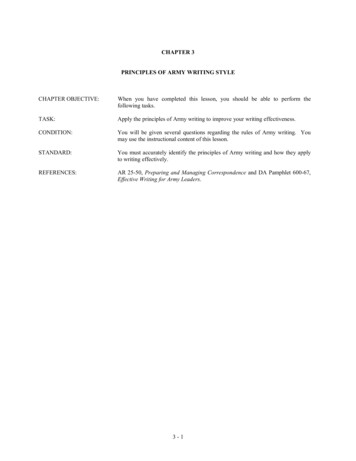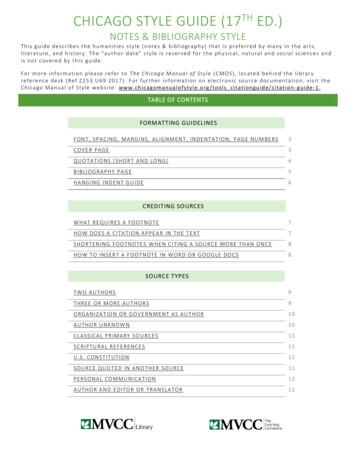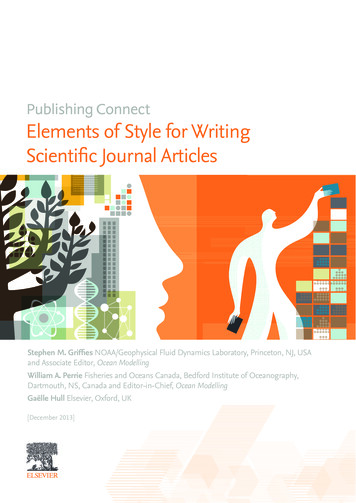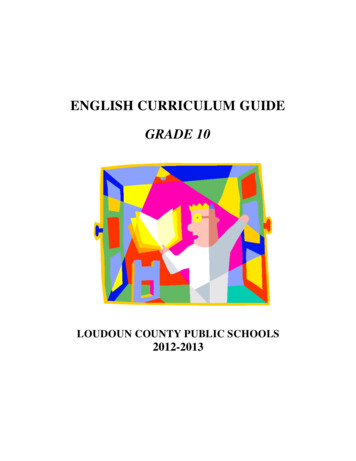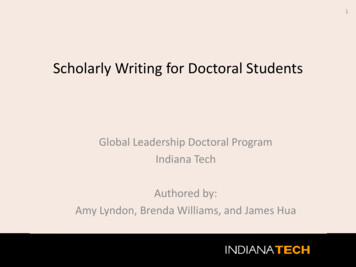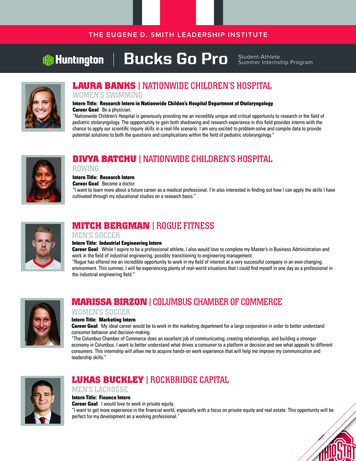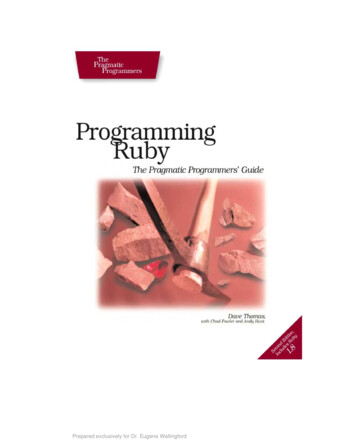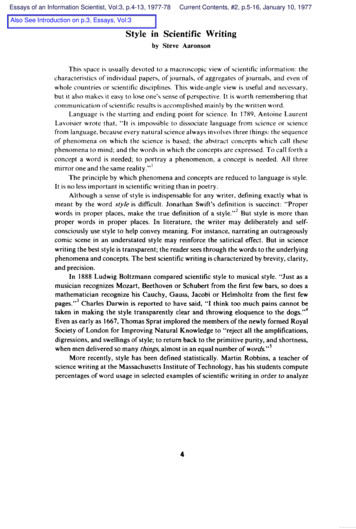
Transcription
Essays of an Information Scientist, Vol:3, p.4-13, 1977-78Current Contents, #2, p.5-16, January 10, 1977Also See Introduction on p.3, Essays, Vol:3Style in ScientificWritingby Steve AmonsonThis space is usually devoted to a macroscopic view of scientific information: thecharacteristics of individual papers, of journals, of aggregates of journals, and even ofwhole countries or scientific disciplines. This wide-angle view is useful and necessary,but it also makes it easy to lose one’s sense of perspective,communicationof scientificresults is accomplishedIt is worth rememberingmainly by the writtenLanguage is the starting and ending point for science.Lavoisierwrotethat, “It is impossibleto dissociate10 1789, Antoinelanguagethatword.from scienceLaurentor sciencefrom language, because every natural science always involves three things: the sequenceof phenomena on which the science is based; the abstract concepts which call thesephenomena to mind; and the words in which the concepts are expressed. To call forth aa word is needed; to portray a phenomenon, a concept is needed. All threemirror one and the same reality.’”The principle by which phenomena and concepts are reduced to language is style,It is no less important in scientific writing than in poetry.Altbougb a sense of style is indispensable for any writer, defining exactly what ismeant by the word style k difficult. Jonathan Swift’s definition is succinct: “Properwords in proper places, make the true definition of a style. ”2 But style is more thanproper words in proper places, In literature, the writer may deliberately and self-conceptconsciously use style to help convey meaning. For instance, narrating an outrageouslycomic scene in an understated style may reinforce the satirical effect. But in sciencewriting the best style is transparent; the reader sees through the words to the underlyingphenomena and concepts. The best scientific writing is characterized by brevity, clarity,and precision.In 1888 Ludwig Boltzmann compared scientific style to musical style. “Just as amusician recognizes Mozart, Beethoven or Schubert from the tirst few bars, so does amathematician recognize his Cauchy, Gauss, Jacobi or Helmholtz from the first fewpages.”3 Charles Darwin is reported to have said, “I think too much pains cannot betaken in makkg the style transparently clear and throwing eloquence to the dogs.”4Even as early as 1667, Thomas Sprat implored the members of the newly formed RoyalSociety of London for Improving Natural Knowledge to “reject all the amplifications,digressions, and swellings of style; to return back to the primitive purity, and shortness,when men delivered so many things, almost in an equal number of words.”5More recently, style has been defined statistically. Martin Robbins, a teacher ofscience writing at the Massachusetts Institute of Technology, has his students computepercentages of word usage in selected examples of scientific writing in order to analyze4
and understand the writer’s style. b He explains that this type of style analysis is similarto first-year work in a traditional art school, where students use the work of the mastersfor models. In this case, the “masters” include Einstein, Oppenheimer, Gardner, Hoyle,Bronowski, Asimov, Russell, Whitehead, Carson, and Krutch. The students takesamples of the writing of each, and then compute the types of sentence structure andword usage. For instance, one student found that a 426-word sample from JacobBronowski’s The Identity ofkfan had 3 paragraphs,21 sentences averaging 20.3 wordsper sentence, an average of 1.8 syllables per word, an average of 2.65 prepositionalphrases per sentence, and an average of 0.6 adjectives per sentence. The sentenceand 1490 compoundstructure was 24% simple, 48 Z0 complex, 14% compound,complex,’This type of statistical analysis can be extended to include paragraph strategies,transitions, vocabulary, rhetorical devices, and figures of speech. Its primary value isthat it allows students to examine style without being distracted by content, Robbinsfeels that as a result of the assignment, the students “become aware of how much awriter’s style is part of what he says. ”It is an obvious but often forgotten fact that recognition-ofboth a discovery andits discoverer-dependson the use of language. Scientific tindings must be translatedinto comprehensible language—which then will be published, The physicist John RaderPlatt wrote,The failure to recognize a brilliant man is only partly due to thestupidity or stubbornness of the scientific community; it is also partly his ownfault.For brilliance has an obligation not only to create but also to communicate. A scientist cannot really go ‘voyaging through strange seas of thoughtalone.’ The more penetrating eye will see him to be surrounded by a cloud ofwitnesses. He takes from othe he gives to others. He must address theproblems of his time. He must translate his thoughts into the language of hiscontemporaries. He must scatter them abroad for interaction. A thoughtwhich has not penetrated to other minds will die unfruitful.As a result, the scientist can hardly be recognized posthumously, likethe artist or poet. He is much less independent, much more bound to thecurrent needs and pur sca of the scientific community. His achievement ofthought needs to be at the same time an achievement of communication andleadership which must be acknowledged by the group-byat least oneeditor ! —before its intellectual viability fades away.8It is unfortunate that so many of us devote so little attention to our choice of words.Although we don’t like to admit it, many scientists believe that scientists had bettersound scientiftc- he more scientific the better. This often means using scientific jargoninstead of plain language. The defenders of scientific jargon claim that it allows greaterbrevity and exactitude than ordinary language. It is true that most of those familiar with5
jargon find it agreeable. The cognoscenti are pleased by what they perceive as Jargon’sprecision and aura ofscientitic objectivity, They are also delighted by the fact that theirjargon renders their field incomprehensible to outsiders, enabling them to cultivate theimpression that only they—the experts-canunderstand the deep mysteries involved.Jargon can be a useful form of shorthand, especially in cases where the discovery ofa new substance or property demands that new terms be coined. But even in such cases,the discoverer is often unaware of the implications of the names he chooses. Forexample, Platt points out,Without Newton himsetf, we might never have had ‘force’ or ‘mass’ inthe equations of motion; or they might have had very different definitions andemphases. Philosophers have pulled and hauled at them for centuries; thedifficulties were ineradicable, because these symbols were written from thebeginning in the Newtonian equations that worked. The Father of Physics hasimprinted ‘force’ and ‘mass,’ like intellectual genes, into every cell of thephysical sciences today.Kepler, on the other hand, seems to have eschewed, largely on aestheticgrounds, the anthropomorphic concept of ‘force’ between heavenly bodies. Inthis question of taste, he anticipates Einstein. If history had put the Keplermind in the Newton body, it might have delayed the discovery of universalgravitation, which would have been difficult for Kepler—but it might haveaccelerated the discovery of general relativity.Terminology is often chained to such initial biases. Franklin’s choice ofthe arithmetic terms ‘positive’ and ‘negative’ to designate the two supplementary types of electricity still plagues our thinking and may have delayed whoknows what happier synthesis.The idiosyncrasies of taste and choice, of abilities and workmanship,embellish and modify a discovery. The work method is determined; the style isnot.8But too often the jargon of scientificspecialistsis like political rhetoric andbureaucraticmumblespeak:ugly-sounding,difficult to understand, and clumsy,Those who use it often do so because they prefer pretentious, abstract words to simple,concrete ones. Such writers want to dignify not only the subject, but also the writer.They believe that important matters require a special vocabulary.The limitations of scientific jargon can be illustrated by looking at another type ofjargon. Consider turn on, out of sight, uptight, rap, cop-out, busted, bumme groove,hip, rap, out front, fir out, bread, and freak out. Most are vague, shallow substitutes forordinary words—but they allow members of a particular subculture to excludeoutsiders—’’The establishment’’—from their communications,In the same way, vague words like interfice, operational viable, dimension, andrep/icate often enable scientists to obscure their meaning. “Every profession has itsgrowing arsenal of jargon to tire at the layman and hurl him back from its walls,”g saysWilliam Zinsser. Consider the words infrastructure, functiona gradualism, time-6
phase, reciprocal, systematized, and organizational. Such words may make what issimple appear complex.Many words which have specific technical meanings in one context have beenpopularized in such a way that the original meaning is badly misrepresented. Fromchemist ry and physics, the words acid test, reaction, end product, and potentials areoften misused; from logic diiemma, beg [he question, and dichotomy; from mathematics facto progression, to the nth, proportion, curve, and differentia and fromarchitecture flamboyant, baroque, and rococo.Perhaps the most insidious jargon has arisen from the cult of psychoanalysis.Freudian English has given us ambivalent, complex, ego, extrovert, L%therfigure,fixation, id inhibition, introvert, libido, manic, masochistic, narcissism, phobia,psyche, psychopath, repression, schizophrenic, and subconscious. These words arewidely used and are widely thought to be key concepts— but almost no one is quite surewhat they mean.It has been charged that some of the worst, most offensive jargon is spoken andwritten by sociologists. For example, Fowler asserts that, “Sociology is a new scienceconcerning itself not with esoteric matters outside the comprehension of the layman, asthe older sciences do, but with the ordinary affairs of ordinary people. This seems toengender in those who write about it a feeling that the lack of any abstruseness in theirsubject demands a compensatory abstruseness in their language.” 10 Consider suchphrases as coherent sociai consciousness, situational interactors, and a ustmentalternatives.Why call a slum a depressed socioeconomic area, a salesman a marketingrepresentative, or a dumb kid an underachiever? Wh y use facilitate for ease, numerousfor many, remainder for rest, initial for first, implement for do, suficient for enough,refer to as for call, or attempt for try? Why say utilize for use, perform for do, orchemotherapeutic agent for drug? Why not use the plain instead of the formal; stopinstead of cease, begin instead of commence, hide instead of concea stop instead ofdesist, give instead of donate, foresee instead of visuaJiz true instead of veri?abJe, buyinstead of purchase, find instead of Jocate, get instead of obtain, send instead oftransmit, and go instead of proceed?Many of us clutter our prose with unnecessary verbiage. We use a large wordwhere a small one will suflice, or three words where one will do. This waste of words iscaused by two things: a failure to understand what words mean, and the notion that anidea is more noticeable and effective if it is reinforced. Thus arise such redundantphrases as personaJ friend, short minute, future prospect, solid facts, finai conclusion,successful tn”umph, positive growth, renovated Jike new, defense posture, tire andt2tIgue, hopes and aspirations, help and assistance, prompt and speedy, mutuaJcompromise, and fataJ sfaying whichEdwin Newman calls “the very worst kind. ” 11Some words serve only as excess baggage; eliminating them lightens a heavysentence without losing meaning. Examples of such words are nature(a tool ofa useful
nature a useful tool), t2acfor(the time factor), character (of an unpleasantcharacter),aspecf (has a definitive aspect), condition (weather conditions), and quaIity (a flaccidquality).Writers sometimes use words merely to pad their sentences with extra syllables.Examples of such words are render inoperative, militate against, make contact with, besubjected to, have the effect OLplay a leading part in, make itself felt, exhibit a tendencyto, serve the purpose of and give rise to. ‘Xmple one-syllable conjunctions are replacedby such phrases as with respect to, the &ct that, having regard to, in view OKin theinterests o and on the hypothesis that.A satirical “Glossary for Research Reports” compiled by C.D. Graham, Jr. 12translates the familiar, rather pompous phrases “It is suggested that.”, “It is believedthat.”, and “It may be that.” to “I think .” Instead of “[t has long been knownthat.” he reads, “1 haven’t bothered to look up the original reference.” For “of greattheoretical and practical importance” he reads “A couple of other guys think so too. ”For “It is clear that much additional work will be required before a completeunderstanding.”he reads, “I don’t understand it.” Although Graham is pressing thepoint for the sake of humor, working scientists will recognize the essential veracity ofhis translations.Consider too these examples of pseudo-scientific writing from astronomer Paul W,Merrill’s satirical article,“The Principlesof Poor Wnting.”13Bib/e: Render to Caesar the things that are Caesar’s.Poor: In the case of Caesar it might well be considered appropriate froma moral or ethical point of view to render to that potentate all of those goodsand materials of whatever character or quality which can be shown to havehad their original source in any portion of the domain of the latter.Shakespeare: I am no orator as Brutus is.Poor: The speaker is not what might be termed an adept in theprofession of public speaking, as might properly be stated of Mr. t3rutus. 14Besides the use of jargon and nonsense words, one of the main causes of dullness inscientific and technical reports is the use of the passive voice. Apparently, many writersthink that passivity is more appropriate to the dispassionate communicationofobjective results than the use of active verbs and straightforward sentence construction.They write, “The wave motions are caused by the wind,” instead of, “The wind causesthe wave motions. ” Unnecessary use of tbe passive voice makes for tedious, monotonous, lifeless prose.Syntax, or the sequence of words within the sentence, is also crucial to style. In1789, George Henry Lewes wrote,Words are not like iron and woect, coal and water, invariable in theirproperties, calculable in their effects. They are mutable in their powers,
deriving force and subtle variations of force from very trifling changes ofposition; colouring and coloured by the words which precede and succeed;significant or insigniticarrt from the powers of rhythm and cadence. It is thewriter’s art to to arrange words that they shall suffer the least possibleretardation from the inevitable friction of the reader’s mind. The analogy of amachine is perfect. In both cases the object is to secure the maximum ofdisposable force, by diminishing the amount absorbed in the working, 15In order to demonstrate the importance of style, E,B. White has taken ThomasPaine’s familiar and enduring sentence, “These are the times that try men’s souls,” andhas tried to alter its style while preserving its meaning. He came up with thesevariations: “Times like these try men’s souls. ” “ How trying it is to live in times likethese ! “ “These are trying times for men’s souls. “ “Soulwise, these are trying times. ”16Would any of these have endured? Obviously, each of the variations destroys theelegant simplicity of Paine’s style.Lewes proposed another illustrationof the importanceof economy in writing, Hetook his example from the Bible:“God said: Let there be light ! and there was light.” This is aconception of power so calm and simple that it needs only to be presented inthe fewest and the plainest words, and would be confused or weakened by anysuggestion of accessories. Let us amplify the expression in the redundant styleof miscalled eloquent writers: ‘God, in the magnificent fulness of creativeenergy, exclaimed: Let there Ix light! and 10 ! the agitating fiat immediatelywent forth, and thus in one indivisible moment the whole universe wasillumined.’ We have here a sentence which I am certain many a writer would,in secret, prefer to the masterl,yl lainness of Genesis. It is not a sentence whichwould have captivated critics.In 1946, George Orwell satirized pseudo-scientific jargon by composing a parodyof a well-known verse from Ecclesiastes. 17Here is Orwell’s “Modern English” version:“Objective consideration of contemporary phenomena compels theconclusion that success or failure in competitive activities exhibits no tendencyto be commensurate with innate capacity, but that a considerable element ofthe unpredictable must invariably be taken into account.”The original was:“I returned and saw under the sun, that the race is not to the swift, northe battle to the strong, neither yet bread to the wise, nor yet riches to men ofunderstanding, nor yet favour to men of skill; but time and chance happenethto them all.”9
Orwell used this example to lament the loss of vivid, concrete images from modernprose. He said, “Modern writing at its worst does not consist in picking out words forthe sake of their meaning and inventing images in order to make the meaning clearer. Itconsists in gumming together long strips of words which have already been set in orderby someone else, and making the resu ts presentable by sheer humbug. The attraction ofthis way of writing is that it is cmy. It is easier venquicker, once you have the habit—to say 10 my opinion it is not an urr@tifiabk assumption that than to say I think. “Orwell pointed out that in the same way as words like epic and historicare used “todignify the sordid processes of international politics,” such words as phenomenon,elemen(, individual, objective, categorical, effective, virtualj basic, primary, promote,constitute, exhibit, e.rploit, and utilize “are used to dress up simple statements and givean air of scientific impartiality to biased judgements. ” He said, “Bad writers, andespecially scientific, political and sociological writers, are nearly always haunted by thenotion that Latin or Greek words are grander than Saxon ones, and unnecessary wordslike expedite, ameliorate, predict, extraneous, deracinated, clandestine, subaqueous andhundreds of others constantly gain ground from their Anglo-Saxon opposite numbers.”]’Scientific writers could well heed the six concise rules that Orwell set forth in hisessay “Politics and the English Language”:(1)(2)(3)(4)(5)(6)Never use a metaphor, simile or other figure of speechwhich you are used to seeing in print.Never use a long word where a short one will do,If it is possible to cut a word out, always cut it out.Never use the passive where you can use the active.Never use a foreign phrase, a scientific word or a jargon word ifyou can think of an everyday English equivalent.Break any of these rules sooner than say anything outrightbarbarous. 17Facts—whetherbaseball scores or historical dates or atomic numbers— are chaosuntil they have been selected, isolated, and combined in relation to one another,Meaning is the selection and juxtapositionof evidence. It is as futile for a TVsportscaster to try to present all the available information on a baseball game as for ascientist to try to present a//the data on a given phenomenon. The compulsion toinclude everything, leaving nothing out, does not prove that one has unlimitedinformation; it proves that one lacks discrimination,A. N. Whitehead has asserted that the task of science “is the discovery of therelations which exist within that flux of perceptions, sensations, and emotions whichforms our experience of life. The panorama yielded by sight, sound, taste, smell, touch,and by more inchoate sensible feelings, is the sole field of activity . 1 insist on the10
radically untidy, ill-adjusted character of the fields of actual experience from whichscience starts. To grasp this fundamental truth is the first step in wisdom, whenconstructing a philosophy of science. The fact is concealed by the influence of language,molded by science, which foists on us exact concepts as though they represented theimmediate deliverances of experience. ” 16In a speech almost a century ago, William James discussed the problem of usinglanguage to bring order out of chaos—the function of style:The real world as it is given objectively at this moment is the sum totalof all its being and events now. But can we think of such a sum? Can we realizefor an instant what a cross-section of all existence at a definite point of timewould be? While I tatk and the !Iies buzz, a sea gull catches a fish at the mouthof the Amazon, a tree falls in the Adirondack wilderness, a man sneezes inGermany, a horse dies in Tartary, and twins are born in France. What doesthat mean? Does the contempxaneityof these events with one another, andwith a million others disjointed, form a rational bond between them, and unitethem into anything that means for us a wortd? Yet just such a collateralcontemfxwaneit y, and nothing else, is the real order of the world. [t is an orderwith which we have nothing to do but to get away from it as fast as possible. AsI said, we break it: we break it into histories, and we break it into arts, and webreak it into sciencw, and then we begin to feel at home. We make tenthousand separate serial orders of it, and on any one of these we react asthough the others did not exist. We discover among its various parts relationsthat were never given to sense at all (mathematical relations, tangents, squares,and roots and logarithmic functions), and out of an infinite number of these wecall certain ones essential and lawgiving, and ignore the rest. Essential theserelations are, but only forourpurpose, the other relations king just as rest andpresent as they; and our purpose is to conceive simp[yand to foresee. Are notsimple conception and prevision subjective ends pure and simple? They are theends of what we call science; and the miracle of miracles, a miracte not yetexhaustively cleared up by any philosophy, is that the given order lends itselfto the remodeling. It shows itself plastic to many of our ntific, to many ofour aes!hetic, to many of our practical purposes and ends.Various authors have commented on the peculiar problems of organizing andwriting a scientific paper.20’21 Robert A. Day’s “How to Write a Scientific Paper”22 isnotable among recent contributions. But few of these writers bother to define style.Ultimately, style is what gives meaning to thoughts. The sense data of commonplace experience are highly disordered. We impose order by the rigor and neatness oflanguage. If, as Albert Einstein said, “The whole of science is nothing more than arefinement of everyday thinking, “23 then in scientific writing style is the principle bywhich everyday thoughts are refined. “Science is built up with facts, as a house is withstones,” said Jules Henri Poincare’, ” but a collection of facts is no more a science than aheap of stones is a house.”24 Style is the architect.11
“The only thing that is indispensable for the possession ofa good style is persomdsinctmty “z says Herbert Read. But sincerity is not enough. In order to pr(mmte thevigorous and efticient exchange of scientific informtition, scientific writers should betrained in rhetoric, the effective use of language. Studen[s must be conwnced that theydo not kmn v hat they mean until they can .s:J} what they mean. Perhaps allundergraduate science majors should be required to take at least one college course inscientific writing.1[ is well known that skills can be taught, but the essential ingredient of goodstyle—honesty-isoften thought to be innate. It is not. S. Le(mard Rubinstein, directorof the writing program at the Pennsylvania State University, asserts that, “If a manintends 10 impress someone, his work will not be clear, because he does not intendclarity: he intends to impress . A man’s intention is his instrument. He must learn thatinstrument. He must be honest. And to be honest, he must recognize that desire to hehonest is not enough. Honesty is a skill, and the skill must be learned.” bOne of the best definitions of style for scientists was written in 1948 by the titornicphysicist J. Robert Oppenheimer. He said:The problem of doing justice to the Implicit, the imponderable, and theunknown is of course not unique to prslltics. [t is always with us in science, tt ISwith us in the most trivial of personal afllirs, and It is one of the great problemsof writing and nf all forms of ar{. The means by which it is solved Msometimesctilled style. It is style which complements affirmation with Iimitatmr andwith humility; it is style which makes it possible to act etTectlvely, but notabsolutely: it is style which, in the domain of foreign policy, enables us to find aharmony between the pursuit of ends essential to us and the regard for theviews, the sensibilities, and aspirations of those [o whom the problem mayappear In another light; it is style which is the deference that action ays toJ’uncertainty; It is above all style through which power defers to reason, -1 hope that this discussion of the importance of st yle doesn’t cause an epidemic ofwriter’s block among its readers. Those who might take the matter of style too seriouslycan take comfort in Benjamin Fmnklin’s conclusion to a letter describ ng his electricalexperiments:Those thoughts, my dear friend, are many of them crude and hasty; andif 1 were merely ambitious of acquiring some reputation in philosophy, I oughtto keep them by me, titl corrected and improved by time, and fartherexperience. But since even short hints and imperfect experiments in any newbrmrch of science, being communicated, have oftentimes a good effect, inexciting the attent ion of the ingenious to the subject, and so become theoccasion of more exact disquisition, and more compleat discoveries, you are atliberty to communicate this paper to whom you ptease: it being of moreimportance that knowledge should increase, than your friend should bethought an accurate philosopher. g12
1, favoisierA L. Trait;elementairede chimie,tr, J Lipetz, D E Gershecssocr &D A Greenberg. Quoted in : J Bartlett, Familiar quotations.s (Boston: Little Brown,1968), p, 474.2. Swift J. Letter to a young clergyman,9 January 1720. Quoted in: J Bartlett, Fami/iarquotations, p. 389.3. Boltzmarm L. Quoted in: R L Weber (comp. ), A random walk in science(New York:Crane Russak, 1973), p, 43.4. Darwin C. Quoted in L V Ryan, A science reader (New York: Holt Rinehart & Winston,1959), p. 11.13,5. Sprat T. Quoted in L V Ryan, A science reader, p. 249.56.6. Robbins M. Science meets style; bridging the two cultures. Key Reporter 40(4):1 passirn,1975,7. Hattman C. Style anafysis of The Identity of Man by Jacob Bronowski. Unpub. ms., 1975,8, Pfatt J R. Style in science. Harper’s Magazine, October 1956. Reprinted in: L V Ryan,A science reader, p. 245-589. Zinaser W. On writing well; an informal guide to writing nonfiction (New York: Harper &Row, 1976), p, 15,10. Fowler H W. A dictionary of modern English usage, ‘2nd ed. (New York: Oxford UniversityPress, 1965), p. 569-70,1I Newman E. A fatal slaying of the very worst kind. Athsrrtic Monthly 283(3):68-74, March1976.12. Graham C D . A glossary for research reports, Metal Progres 7 I :75, 1957. Reprinted inL. Weber, A random walk, p. 120-21,13. Merrifl P W. Quoted in: L V Ryan, ,4 science reader, p. 18-22.14. Swain P W. Quoted in L V Ryan, A science reader.15. Lewes G H. Quoted in L V Ryan, ,4 science reader,p. 13.17.16. White E B & Strunk W. The elements of tyle (New York: Macmillan, 1972).17. OrweU B. Politics and the English language, in ,4 collection of essays by George Orwell(Garden City: Doubleday, 1954), p. 162-76.18. Whitefsead A N. Quoted in: W Gin(cd), The limits of language (New York: Hill &Wang, 1962), p. 1O-I4,19. James W. Reflex action and theism. Quoted in: W. Gibson, The limits of language, p. 3-9.20. Orth M F. Color their prose gray. IEEE Trans. Profess. Commun. PC-18 (2): 65-66, 1975.21. Clark A K. Readability in technical writing; principles and procedures. IEEE Trarss.ProJess. Cornmun. PC.18(2): 6770, 1975.22. Day R A. How to write a scientific paper. Carrud. J. Med. Technol 38(3): BIOO-04, 1976.Familiar quotations, p. 950.23, EnteinA. Physics and reality, 1936. Quoted in:J. Bartktt,24. Poineare J H. La science et I’hypothese, tr. G B Halsted. Quoted in: J Bartlett, Familtirquotations, p. 829.25. Read H. English prose style (Boston: Beacon Press, 1970), p. 115.26. Rubirrstein S L. Writing: a habit of mind (Dubuque,Iowa: William C. Brown, 1972).27. Oppenheimer JR. Quoted in: W, Gibson, The limits of language.28. Fr-arsfdin B. Quoted in L V Ryan, A science reader.13
comic scene in an understated style may reinforce the satirical effect. But in science writing the best style is transparent; the reader sees through the words to the underlying phenomena and concepts. The best scientific writing is characterized by brevity, clarity, and precision. In 1888 Ludwig Boltzmann
